Military police officers patrol the deserted Heroes' Square in Budapest on April 6, where Prime Minister Viktor Orban's anti-coronavirus measures have allowed him to rule by decree indefinitely.Bernadett Szabo/Reuters/Reuters
With governments around the world adopting extraordinary measures amid the pandemic, ostensibly to protect their citizens – but often in directions that have little or nothing to do with public health – one of the most potent legacies of this era may prove to be a global erosion of democratic freedoms.
The power grabs have been dubbed “coronavirus coups” in some countries, and three months into the crisis, with no end in sight, there are concerns that leaders such as Hungary’s Viktor Orban are capitalizing on COVID-19 to seize powers they may never relinquish.
Some of the countries that have seen the biggest changes to personal liberties are still dealing with the legacies of past authoritarian rule. The steps they have taken in recent weeks toward autocracy may prove hard to reverse.
The most dramatic example so far has been Hungary, where Mr. Orban used his Fidesz party’s parliamentary majority late last month to push through legislation that allows him to rule by decree for an indefinite period of time. Though his government says the measures are necessary to protect lives, there are worries that Hungary, a member of the European Union and the North Atlantic Treaty Organization, has become an effective dictatorship.
“He’s been on this path for more than a decade,” said Michael Ignatieff, the rector of the Central European University, which was headquartered in Budapest until Mr. Orban’s government forced it to relocate to Vienna last year in what was seen as an earlier crackdown on dissenting voices. “He’s taken advantage of the situation to take Hungary a further step away from democracy.”
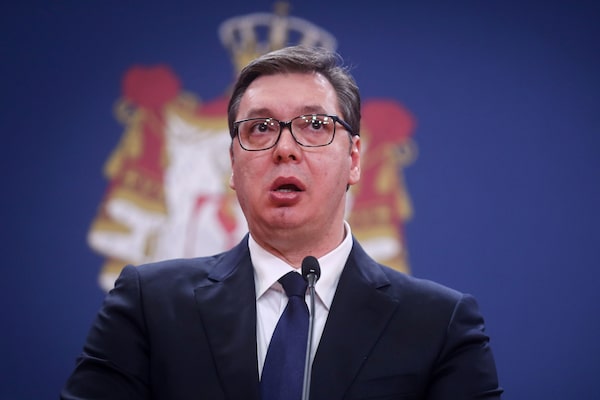
Serbian President Aleksandr Vucic declares a state of emergency on March 15.OLIVER BUNIC/AFP via Getty Images/AFP/Getty Images
Similar accusations are being made about Serbian President Aleksandar Vucic, who shut down his country’s parliament as part of an open-ended state of emergency he declared on March 15. The army has since been deployed in parts of the country, a 5 p.m. to 5 a.m. curfew is in effect and people older than 65 have been banned from leaving their homes.
Borko Stefanovic, a prominent opposition politician, told The Globe and Mail that Mr. Vucic, who served as information minister to strongman Slobodan Milosevic, was resorting to the same tactics his former boss did to consolidate his power during the wars of the 1990s.
“You can see it on TV and read it in our controlled media – everything is about him, Vucic, and how he is strong and how he isn’t sleeping and how he is working with our brother Xi Jinping to secure ventilators," Mr. Stefanovic said. It’s a mixture of 1984 and Monty Python, but unfortunately people are dying so we can’t laugh at it.”
There are other worrying examples. In the Philippines, President Rodrigo Duterte said his security forces would be allowed to “shoot to kill” anyone who violates a government-mandated stay-at-home order. In Israel, Prime Minister Benjamin Netanyahu – who just weeks ago seemed to be facing the end of his political career – took advantage of the crisis to shutter the country’s parliament and postpone his own trial on three corruption-related criminal charges.
Mr. Netanyahu now appears to be on the verge of signing an improbable power-sharing pact with opposition leader Benny Gantz, who had previously vowed he would never join a government led by his rival. The reported deal would allow Mr. Netanyahu to remain as Prime Minister for the next 18 months before swapping jobs with Mr. Gantz to assume the newly empowered post of deputy prime minister. “It is presented as a coronavirus coalition, but coronavirus is really the excuse or the pretext for the opposition to back away from their pledges and sit with [Mr. Netanyahu] in government,” said Yuval Shany, vice-president of research at the Israel Democracy Institute.
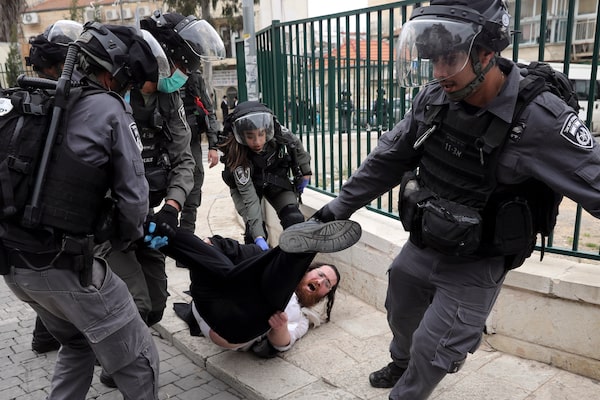
Israeli police arrest an ultra-Orthodox Jew during a March 30 protest in Jerusalem's conservative Mea Shearim neighbourhood against the government's measures to stop the spread of the coronavirus.Mahmoud Illean/The Associated Press/The Associated Press
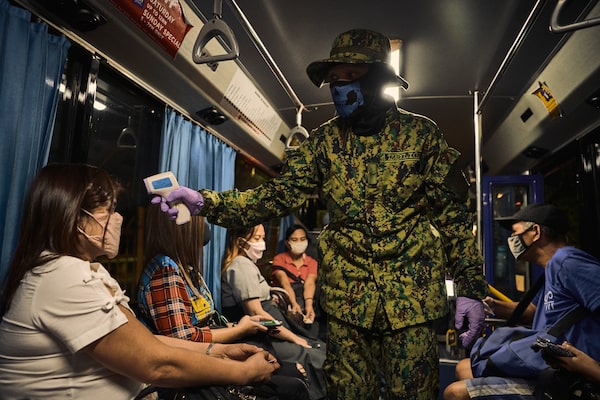
Commuters passing through a police checkpoint in Quezon City, Philippines, have their temperatures taken.Jes Aznar/Getty Images/Getty Images
The strongmen are expanding their powers, in many cases, with the support of those they govern.
“People rally around the flag, they rally around the leader because we want them to succeed," said Mr. Ignatieff, a former leader of Canada’s Liberal Party. “We want them to succeed because we don’t want our loved ones to die. We’re willing to accord people powers that we’d never accord them in a normal situation.”
The key to preventing temporary powers from becoming permanent ones, Mr. Ignatieff added, was ensuring that the media remain free during the crisis to put questions to both the politicians and those advising them.
But that is not what’s been happening.
Coronavirus guide: Updates and essential resources about the COVID-19 pandemic
‘Can I take my kids to the park?’ And more coronavirus questions answered by André Picard
In Hungary, a new law has made it an offence to publish “misinformation” about the government’s pandemic-control efforts. In Zimbabwe, the government of President Emmerson Mnangagwa has authorized 20-year prison terms for anyone who publishes or communicates “false news” about any police officer or government official who is involved in enforcing the national lockdown.
Human-rights groups have warned that such laws are so vague and excessive that they allow the government to silence journalists or social-media voices.
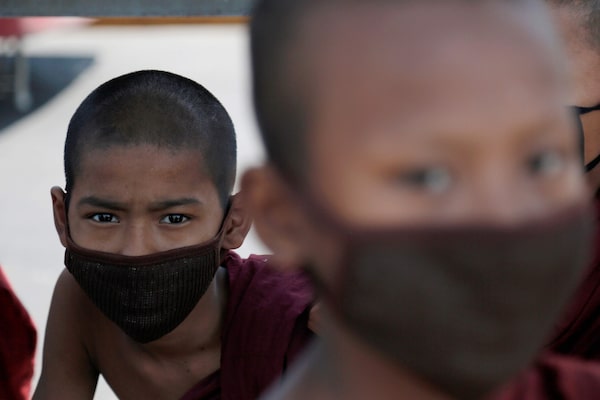
Young Buddhist monks wear masks in Yangon, Myanmar, one of the Asian nations where restrictions on media have intensified during the pandemic.SAI AUNG MAIN/AFP via Getty Images/AFP/Getty Images
A similar crackdown on media is also unfolding across much of Asia. While Indian Prime Minister Narendra Modi’s efforts to force Indian media to publish only the government’s version of the pandemic fight was rejected by the Supreme Court, many of India’s neighbours lack such checks on power.
In the past week, authorities in Myanmar have blocked access to 221 news websites, saying they carried “fake news.” At least six journalists have been arrested or have fled.
“The Myanmar military is taking advantage because of COVID-19,” Hline Thit Zin Wai, one of the journalists on the run, told The Globe in a conversation through an encrypted messaging app. “The virus has destroyed the partial democracy in our country. The fact that journalists are running and hiding – it means that press freedom has also collapsed.”
In the Philippines, an emergency law came into force March 24 outlawing virus-related information that may cause “chaos, panic, anarchy, fear, or confusion.” The country’s National Bureau of Investigation has since issued subpoenas to at least 17 people, including two journalists, accusing them of distributing “fake news.”
Even before the pandemic, “we were already witnessing, one by one, deliberate attacks on the democratic institutions that are supposed to serve as checks and balances,” said Chel Diokno, a prominent human-rights lawyer and founding dean of the College of Law at De La Salle University in Manila. Now the concern is that the pandemic “will result in more repressive measures imposed by the government in an attempt to keep order.”
In Thailand, where military rule has already scrubbed local media of much dissent, Prime Minister Prayuth Chan-ocha has assumed the power “to censor or shut down media if deemed necessary,” according to a government decree. Cambodian authorities have arrested more than a dozen people for sharing pandemic information, four of them people aligned with the opposition Cambodia National Rescue Party, which has been formally dissolved.
Thai military police and police officers wearing protective masks question people at a checkpoint in Bangkok on April 3 after a curfew was imposed.Athit Perawongmetha/Reuters/Reuters
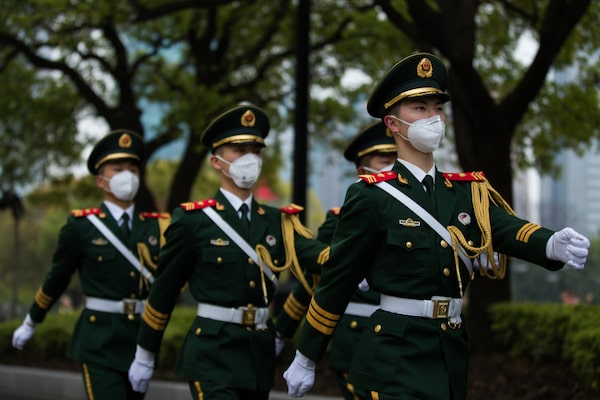
Chinese soldiers wear protective masks at the People's Square in Shanghai on April 4.Yifan Ding/Getty Images/Getty Images
In China, meanwhile, hundreds of people have been arrested for online comments, while governments and companies alike have made the use of cellphone apps and other tracking tools mandatory, expanding the country’s already-sophisticated surveillance state. Similar tracking technologies have been deployed by governments around the world, both authoritarian and democratic.
Hong Kong, which until the crisis had been the scene of regular protests calling for greater autonomy from China, has been under particular pressure. In February, police arrested Jimmy Lai, a pro-democracy media tycoon despised by Beijing, and several other top democracy figures, accusing them of participating in an illegal assembly last summer. An outspoken nationalist lawmaker has pushed for the passing of national security laws that would prohibit treason, “subversion against the Central People’s Government” or ties with foreign political entities. His timing has historical resonance: A previous attempt to enact such laws in 2003 failed amid the SARS crisis.
This time, “some people in the pro-Beijing camp may think that it is a good time to try to take very harsh measures because the world, especially those countries which may support Hong Kong, are now very preoccupied with their own problems,” said Emily Lau, a pro-democracy politician in Hong Kong.
There is a tendency among governments “to respond to this crisis in the one way they know how, which is by tightening control,” said Sebastian Strangio, an author and scholar who studies Southeast Asia.
Another recurring theme has seen authoritarian leaders use this moment to push through legislation persecuting LGBTQ citizens. One day after Mr. Orban gained his rule-by-decree powers, his government submitted a bill that would make it illegal to change a person’s gender. In Uganda, where the government of President Yoweri Museveni has a long history of persecuting gay people, police arrested 23 members of the LGBTQ community at a shelter in late March, accusing them of violating rules on social distancing.
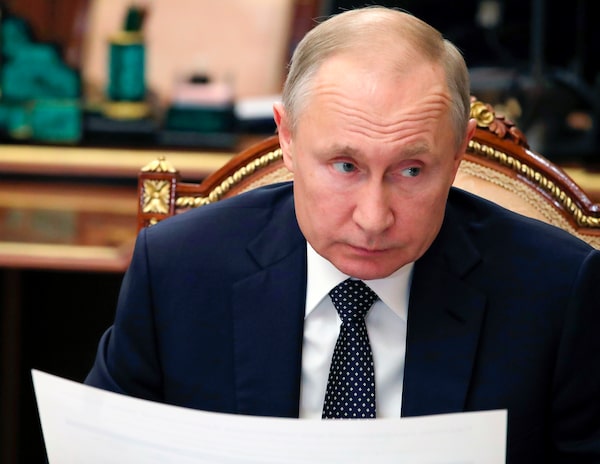
Russian President Vladimir Putin.Mikhail Klimentyev, Sputnik, Kremlin Pool Photo via AP/The Associated Press
One authoritarian leader who has not benefited from the crisis is Russian President Vladimir Putin, who was forced to postpone an April referendum on constitutional changes that would have allowed him to remain in power for another 16 years. Even more remarkably, the Kremlin’s wobbly handling of the crisis has allowed alternate centres of power – primarily Moscow Mayor Sergey Sobyanin, who has often moved faster than the Kremlin in taking steps to deal with the pandemic – to emerge in Russia for the first time since early in Mr. Putin’s two-decade-long rule.
While authoritarianism is on the rise around the world at the moment, some believe the limits of top-down government will be exposed as the crisis unfolds.
“Ultimately, the pandemic is going to lead to a severe economic crisis, and that, more than the pandemic itself, is likely to challenge regimes,” said Steven Levitsky, a professor of government at Harvard University. “But that works both ways. Weak democracies that fare poorly could get into trouble, but poorly performing autocrats will also face trouble.“
Mr. Stefanovic, the Serbian opposition politician, pointed to the 1986 nuclear disaster at Chernobyl and how the Soviet Union’s obsession with controlling information sparked protests that eventually brought the entire system crashing down.
“It’s going to backfire on them,” Mr. Stefanovic predicted. “When you control everything, you are to blame for everything.”
With reports from Geoffrey York in Johannesburg
 Mark MacKinnon
Mark MacKinnon Nathan VanderKlippe
Nathan VanderKlippe